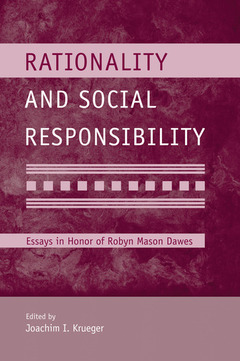Description
Rationality and Social Responsibility
Essays in Honor of Robyn Mason Dawes
Modern Pioneers in Psychological Science: An APS-Psychology Press Series
Coordinator: Krueger Joachim I.
Language: English
Subject for Rationality and Social Responsibility:
Keywords
Linear Model; Vice Versa; Improper Linear Model; False Consensus Effect; Dictator Game; Comparative Judgments; Ultimatum Game; Improper Models; Gambling Device; Gambler's Fallacy; Disaggregated Ratings; Grade Point Average; GPA; Ingroup Cooperation; Risk Factor; World Cup; Cue Weights; Ingroup Favoritism; Mixed ANOVA; Breast Cancer Risk; Judged Probability; Broader Impacts Criterion; Trait Desirability; Diagnostic Ratio; Correlation Weights
Publication date: 06-2014
Support: Print on demand
Publication date: 05-2008
· 15.2x22.9 cm · Hardback
Description
/li>Contents
/li>Biography
/li>
This volume brings together a diverse group of authors who have been associated with Robyn Dawes over the years. The breadth of topics covered reflects Dawes?s wide-ranging impact on psychological theory and empirical practice. The two themes of rationality and social responsibility are well developed in the book. Dawes had always urged investigators to take seriously the question of how individuals can reconcile self-interest (i.e. rationality) with the collective good (i.e. social responsibility). The area of judgment and decision-making poses a similar challenge: here, rational judgment is the most responsible judgment because it minimizes errors. To attain rationality in this domain, individuals need to accept the limitations of their own intuitions.
This volume presents an up-to-date overview of how far psychological science has come in its struggle to reconcile what is true with what is good. Each chapter is a stimulus for new research and a reminder not to forget the hard-won lessons of the past ? in particular, those taught by Robyn Dawes.
J.I. Krueger, A Psychologist Between Logos and Ethos. E. Gold, G. Hester, The Gambler's Fallacy and a Coin's Memory. H.R. Arkes, Being an Advocate for Linear Models of Judgment is Not an Easy Life. J. Dana, What Makes Improper Linear Models Tick? D. Faust, Why Meta-Science Should be Irresistible to Decision Researchers. J.I. Krueger, The Robust Beauty of Simple Associations. D. Moore, D. Small, When It's Rational for the Majority to Believe That They are Better Than Average. M. Bar-Hillel, D.V. Budescu, M. Amar, Wishful Thinking in Predicting World Cup Results: Still Elusive. C. Bicchieri, How Expectations Affect Behavior: Fairness Preferences or Fairness Norms? M.B. Brewer, Depersonalized Trust and Ingroup Cooperation. D. Messick, Must Good Guys Finish Last? S.J. Byram, L.M. Schwartz, S. Woloshin, B. Fischhoff, Women's Beliefs About Breast Cancer Risk Factors: A Mental Models Approach. L.R. Caporael, Groups and the Evolution of Good Stories and Good Choices.



